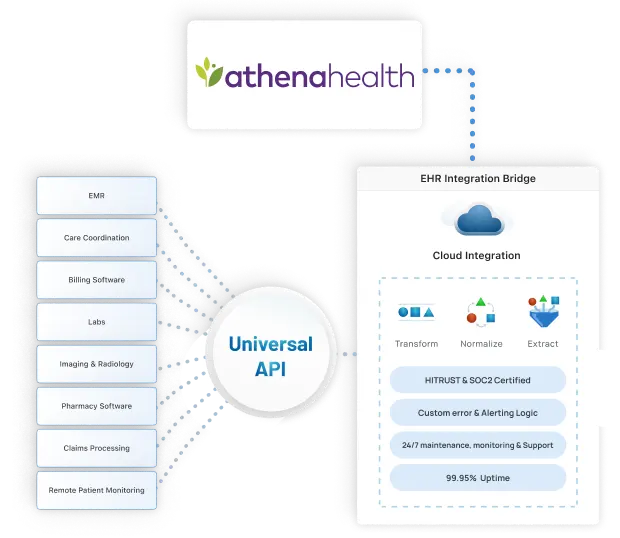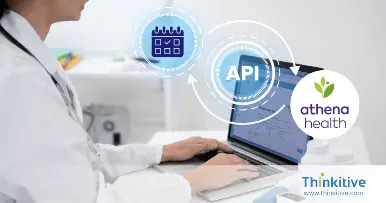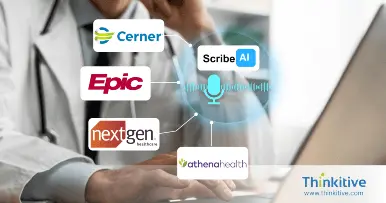ATHENAHEALTH EHR INTEGRATION
Why Do You Need Athenahealth EHR Integration for Your Practice?
Integrate Athenahealth EHR to make your team more effective. You'll break down data barriers and connect systems so your staff can instantly automate routine tasks, leading to much higher efficiency.
Unified Systems
Unify disconnected systems across the globe for connected care delivery
3 Countries
Process Efficiency
Eliminate manual data entry to improve efficiency
75% More Efficient Process
Proven ROI
Practices reported revenue boosts through automation and integration
40% Revenue Increase
CUSTOM ATHENAHEALTH EHR INTEGRATION SERVICES
Our End-to-End Integration Services
Empower your healthcare applications to exchange data effortlessly and securely through our fully customized Athenahealth EHR integration solutions.
Athenahealth EHR Integration Consultation
- Requirement Analysis & Discovery
- Defining Integration Objectives
- Feasibility Assessment & Technical Planning
- Strategy Development & Implementation Support
- Testing, Go-Live & Continuous Support
Access to Athenahealth Sandbox & Production Environments
- Define integration requirements with Athenahealth
- Evaluate available APIs and integration options
- Coordinate interface design and data mapping
- Test integrations for accuracy and compliance
- Secure sandbox and production access
Athenahealth EHR Integration Services
- Develop and integrate secure APIs
- Map and convert healthcare data
- Implement HL7 and FHIR standards
- Build compliant, secure interfaces
- Provide training and ongoing support
Let’s Get Started With Your Athenahealth EHR Integration?
Get started by accessing your system and let’s start your digital transformation journey into a connected healthcare ecosystem.
Athenahealth EHR INTEGRATION BENEFITS
Before & After Athenahealth EHR Integration
ATHENAHEALTH EHR INTEGRATION SOLUTIONS
How we Integrate Your Healthcare System with Athenahealth
1. Custom Integration Solutions
We help healthcare organizations optimize their EHR ecosystem with tailored integration solutions that enable seamless data exchange, streamlined workflows, and enhanced operational efficiency.
Our integration and healthcare domain experts work closely with your team to gather requirements, define desired functionality, identify data exchange needs, and optimize workflows.
We design robust integration architectures, evaluating approaches for scalability, security, performance, and future expansion. Solutions may include API-based integration, data synchronization, messaging protocols, or middleware, tailored to your environment.
We build secure interfaces that allow seamless communication between Athenahealth and your systems. All connections incorporate authentication and authorization mechanisms to protect sensitive patient data.
Our dedicated testing team ensures proper functionality, data accuracy, and system performance. Deployments are carefully managed to enable a smooth transition and go-live process.
2. Custom EHR Integration Bridge Enables Athenahealth Integration
Our mature middleware framework interacts seamlessly with Athenahealth, retrieving data and transforming it into a unified API. This standardization simplifies data exchange across systems while supporting multiple EHR formats.
The bridge includes a universal data converter capable of handling FHIR, CCDA, HL7v2, TXT, CSV, and EDI formats. Key features include scheduled data pulls, status monitoring, backfills, failover handling, and audit logging.
Built on a microservices architecture, the system is containerized and communicates via REST interfaces. High-load services are optimized with dedicated databases, ensuring smooth, reliable performance.
Security is built into every layer: data in transit uses HTTPS (SSL), data at rest is encrypted, and database access is restricted to authorized users. Role-based access controls, encrypted key storage, and comprehensive audit logs ensure compliance and robust data protection.
3. Accelerated Interoperability with Mirth Connect
Our experts leverage Mirth Connect to accelerate your interoperability journey. We rapidly build channels that handle HL7, XML, CCD, DICOM, EDI, NCPDP, and other healthcare messaging standards.
We specialize in creating bi-directional interfaces with HIS, Telehealth networks, PMS, EHR, Lab Information Management, and RIM systems. Mirth-based integrations ensure reliable, secure, and scalable data flow across your healthcare ecosystem.

See How Can Custom Athenahealth EHR
Integration Pay for Itself?
Athenahealth EHR INTEGRATION PROCESS
Custom Athenahealth EHR Integration Process
Process
Requirement Analysis
Define the practice's integration objectives, map clinical workflows, and identify data exchange needs to ensure Athenahealth EHR aligns with the healthcare process.
Integration Capability Testing
Analyze Athenahealth's RESTful APIs, FHIR resources, and available middleware to find the most efficient and secure integration approach.
Interface Design & Development
Create and develop custom interfaces or middleware for scalable, secure, and compliant Athenahealth connectivity.
Implementation & Testing
Roll out the integration modules and perform end-to-end testing to ensure accuracy, speed, and compliance with healthcare regulations.
Going Live & Optimization
Launch the integration production environment, monitor performance closely, and optimize workflows for uninterrupted and efficient operations.
Let’s Integrate Your Athenahealth EHR Integration
Get your first free consultation and uncover how custom Athenahealth EHR integration can change your practice.
Case studies
Sneak-Peek into Our Successful Custom Athenahealth EHR Integration Projects
Explore how our tailored Athenahealth EHR integrations have streamlined workflows, improved data exchange, and enhanced clinical efficiency for healthcare organizations.
CUSTOM Athenahealth INTEGRATION PLANS
Hire Athenahealth EHR Integration Experts
Leverage our flexible engagement models to match your Athenahealth EHR integration needs perfectly. Whether your project is large or small, our scalable approach ensures seamless integration while staying within your budget.
Time & Material Model
Perfect for projects with evolving requirements. Pay only for completed work while workflows adapt dynamically using Athenahealth’s RESTful APIs and FHIR resources.
Hire Dedicated Team
Add skilled professionals to your team. Select, interview, or trial resources and pay hourly based on utilization. Suitable for scalable, cloud-native Athenahealth integrations.
Fixed Price Model
Best for projects with a clearly defined, unchanging scope. Fixed cost and timeline, ideal for smaller, well-documented Athenahealth integration projects with predictable outcomes.

Why Thinkitive is The Best Athenahealth EHR Integration Company for You?
![]() Tailored to Your Needs
Tailored to Your Needs
Thinkitive’s first step to developing ... customizable EHR software is to understand your unique needs and requirements. Based on that, our development team develops a customized software solution to meet your requirements and solve your problems.
![]() Ready-to-Use Components
Ready-to-Use Components
With our ready-to-use technology ...components like video conferencing, appointment, scheduling, and SOAP notes, accelerate your custom EMR Software development process.
![]() Third-Party Integration
Third-Party Integration
Integrate your EHR software system with ... multiple third-party systems like Telemedicine, RPM Devices, Labs, Radiology, etc., to build a complete virtual healthcare ecosystem.
![]() Affordable EHR Solutions
Affordable EHR Solutions
With our ready-to-use base EHR ...software framework, we give you an affordable custom EHR software solution specifically designed for your healthcare practice.
![]() In-Depth Domain Expertise
In-Depth Domain Expertise
With our ready-to-use base EHR ...software framework, we give you an affordable custom EMR software solution specifically designed for your healthcare practice.
![]() Timely Delivery
Timely Delivery
We have curated an EHR system ...development process that covers all the aspects of your healthcare practice’s unique needs and requirements with transparency for on-time delivery.



